Out and about: Road Trip North, Part I
Up to Fukushima, out of Niigata, down to Nagano and back home to Gunma!
Hello dear friends,
Happy New Year! And welcome to our new subscribers! So glad you joined us :)
I had intended to take a break over Christmas/New Years, but hadn’t planned for it to start so early (without notice, sorry!) and end so late!
Such is life!
I won’t bother going into details, it will turn into a novel, haha!! You’ll hear about it soon enough, but first, we need to pick up where we left off…
Just to help us all remember where we were up to in Behind Shoji Doors, my parents were visiting from Australia, we had acquired the Prayer House and had started some renovations whilst also renovating a house for my husband’s workplace. Between all the renovations, we somehow managed to find time to fit in some sight seeing for my parents. We’ll pick up the story with a roadtrip we did, the final big “hurrah” before mum and dad flew back home to Australia…
May 2024
We were pumped! We were having a weekend getaway, doing a roadtrip up to Fukushima, across to Niigata, down to Nagano and then back home to Gunma.
It wasn’t that far distance wise, but I think most Japanese would have only visited one of those destinations in a long weekend, not all four!
To make it really feel like holidays, the kids begged to get up early, before sunrise, and start on our way. My parents are early morning folk, so they wouldn’t even need to set alarms. I was supportive of the idea, after I negotiated the 3am start down to a 5am start! Which meant the sun would already be up (sorry kids!), but it was still early!
It was all excitement and joy as we set off, my husband, Shujin, so keen for a getaway after a very exhausting last two months preparing for, and then running a health retreat (I know, the irony of it all! Almost ruining your own health in order to run a health retreat!). He ended up having to cook for over 40 people… and him being the cook wasn’t on the original plan! To say he was exhausted was an understatement.
So this was the weekend to leave it all behind, relax and recharge. My husband loves nothing better on a weekend than to physically get far away from work and home!
We drove north along the highway, the landscape familiar looking; lush green mountain sides, towns nestled tightly into valleys. Rivers. Always rivers. Through one valley to the next, scenes coming close and then disappearing as we entered a tunnel, and then a new scene appearing at the end. The morning sun danced on it all.
It wasn’t long before our bellies started talking. It was only 6:30am, but we were all getting hungry, even though we eat breakfast later than that at home. Waking up early does that to you. A Service Area was only a few kilometers away, I was relieved we’d be eating soon.
Shujin took the exit and slowed the car down as he pulled up outside the Service Area. A few trucks were parked, but other than that, it was very quiet. Too quiet.
No lights were on in the building. It was closed.
Turns out, the Service Area didn’t open until 8:30am…
“8:30AM??!! Do all Service Areas open that late?!” I couldn’t believe it! I had to wait another two hours before getting breakfast?!
There was a larger Service Area down the road, Shujin suggested that it might open earlier. Might.
Whinging and complaints were flying fast from the children and I tried not to be a bad example.
We kept driving, trying to enjoy the scenery, hoping that the next Service Area’s opening time would be in our favour.
We reached the Service Area. Once again, trucks sat in the parking area. A few cars could also be seen with some minor activity around the toilets, people coming or going. It looked hopeful, but Shujin warned that it might only be the toilets which were opened, and not the corresponding building with the shops inside.
We all piled out of the car. I headed to the toilets. A few people stood around the entrance, looking up. I knew what was there. It was swallow season.
Sure enough, swallow nests looked down at us from their high and safe vantage point at the top of the wall. Babies could be heard, squeaking for their breakfast. Parents darted in and out of the nests, feeding the babies or returning back to the morning world to find the next bite of breakfast for their hungry off-spring.
Swallows are considered a sign of good luck in Japan. They make such an awful mess of poo under the nests, but the Japanese don’t shoo the birds away or encourage them to build their nests elsewhere. No, if the swallow is making its home on your building, good fortune will come your way. Preventing them from building a nest will bring bad luck.
After a visit to the toilet I made my way towards the corresponding building and was so relieved to see it was opened! Not all the shops and restaurants inside were opened, however! But we were able to eat sufficiently, so that was enough.
Back on the road again, I thought about the initial suggestion to leave home at 3am. If we’d left home that early, we would have reached our destination with time to spare before anything opened!!
We’d chosen to go to Fukushima as that was the hometown of Shujin’s father. Shujin had many fond memories of visiting his grandparents there as a child. He was still in contact with one of his father’s cousins who still lived in the area and he was keen to visit the cousin and the land.
I was slightly concerned about visiting Fukushima, what with the earthquake and tsunami a few years back and the nuclear power plant leaking radiation! But Fukushima is a large prefecture, and we wouldn’t be near the area of concern, so I was put at ease, a little.
Turning off the highway, we came to a large lake, Inawashiro Lake. We stopped by the lake. The morning was getting quite warm, but the water in the lake was freezing! I’m not sure who convinced who, but Shujin and Bob decided to do an undie run, straight into the water! It was short lived, of course, but certainly got the adrenaline pumping!
We meandered our way around the lake and first stopped by at the house where Shujin’s father grew up. It looked uninhabited in now. We continued on and finally came to the farm where the cousin lived. We turned off the road and took a side street, passing by an elderly lady riding a bike.
We drove the short distance pass a few flooded rice fields, and reached the house. It was a typical large, wooden farm house, with a tall pitched roof painted blue, also quite common in rural Japan. The cousin welcomed us inside and we gathered around the small square kotatsu (a low table with an inbuilt infrared heater). The morning had felt warm, but now clouds were covering the sky and the temperature had dropped quickly.
Shujin, Okasan and the cousin talked and it wasn’t long before his wife joined us. Terribly hunched over, she came into the room on her bottom, shuffling across the floor. I could see the alarm in Missy’s face, and the shock on Bob’s. I was quite surprised myself, mostly because I recognised her to be the same lady as the one who had been riding the bike! That’s amazing!
Soon photos came out and memories were shared. Mum, dad and myself were totally in the dark with nearly the whole Japanese conversation, but Okasan and Shujin were enjoying the interaction, and I hoped that Missy and Bob would understand and retain some of it too.
As the cousin and his wife shared, they showed us photos of their own children and grandchildren. The usual questions were asked, Where are they now? What are they doing?
All three children were now living in cities, far away. None of them were interested in rice farming. None of them would be taking over the family farm.
As we said our goodbyes and a I took in the scenery I couldn’t help but feel sad.
The farm had seen better days I was sure. The shed was run down. Several old speedboats and a jet-ski sat by a flooded rice field, serving now as just a memory of happy days gone by. The rice fields were planted, but for how many more years could they continue? The cousin was in his 80’s already.
This seems to be a common picture in Japan.
I know the whole population is significantly aging, but I do find it disconcerting, to think that in 10-15 years time, if not sooner, the majority of farmers will have ceased their work and what will be left? Empty fields. And more imported fresh food.
We’d booked to stay the night in Aizuwakamatsu, a local town about 40min from the lake, so off we went. The young rice in the flooded rice fields eventually disappeared and soon we were driving through the streets of the town. Okasan announced that her mother was born here, in Aizuwakamatsu. It was news to me, I thought this place was Shujin’s father’s birthplace, which it was! I’d not heard it was also Okasan’s mother’s birth place too! Okasan announced it regularly, too regularly for Bob, the repetition was driving him crazy. We tried to shush him! Just let it be!
Okasan’s phone rang, it was her friend. The Aizuwakamatsu Police Station had phoned the friend to say Okasan’s purse had been handed into the Police Station. They found the friend’s number in the purse. The friend told Okasan she needed to go to the Police Station to pick up her purse.
It was such an unusual phone call that Shujin initially thought it was some sort of scam!
We all started looking around us in the car for her purse. It was no where to be seen.
Shujin grabbed his phone and checked the location of the AirTag that was on Okasan’s purse. Sure enough, it wasn’t with us, but was at Aizuwakamatsu Police Station!
We headed for the Police Station. Shujin went inside with Okasan to retrieve the purse. When they emerged, Okasan had her purse in hand.
Shujin filled us in on the story. A man had been at the lake, had seen the purse and had driven the 40 minutes to hand it in to the Police Station. He didn’t want any compensation and requested that the police not share his details. Nothing had been stolen from the purse.
I sat in awe and gratitude. We had not stopped at a bustling lake side park. We’d simply seen an opportunity to access the lake and took it. How easy it would have been for that man, with no one else around, to pick up the purse, pocket the money and toss the purse. But instead, the man went out of his way to hand the purse in in hopes that it could be returned to its owner. Such integrity and honesty.
And this is one of the things I absolutely love about Japan.
Now with purse in hand, we headed to Tsuruga Castle. It’s common for castles to boast their own unique characteristics, and for this castle, in Aizu it was the red tinted tiles on the roof. After replacing tiles too often that had cracked in the cold weather, someone had discovered a new compound to add which was more hardy in the cold weather. The compounded happened to be red. Now Tsuruga castle is the only castle in Japan with red tinted roof tiles.
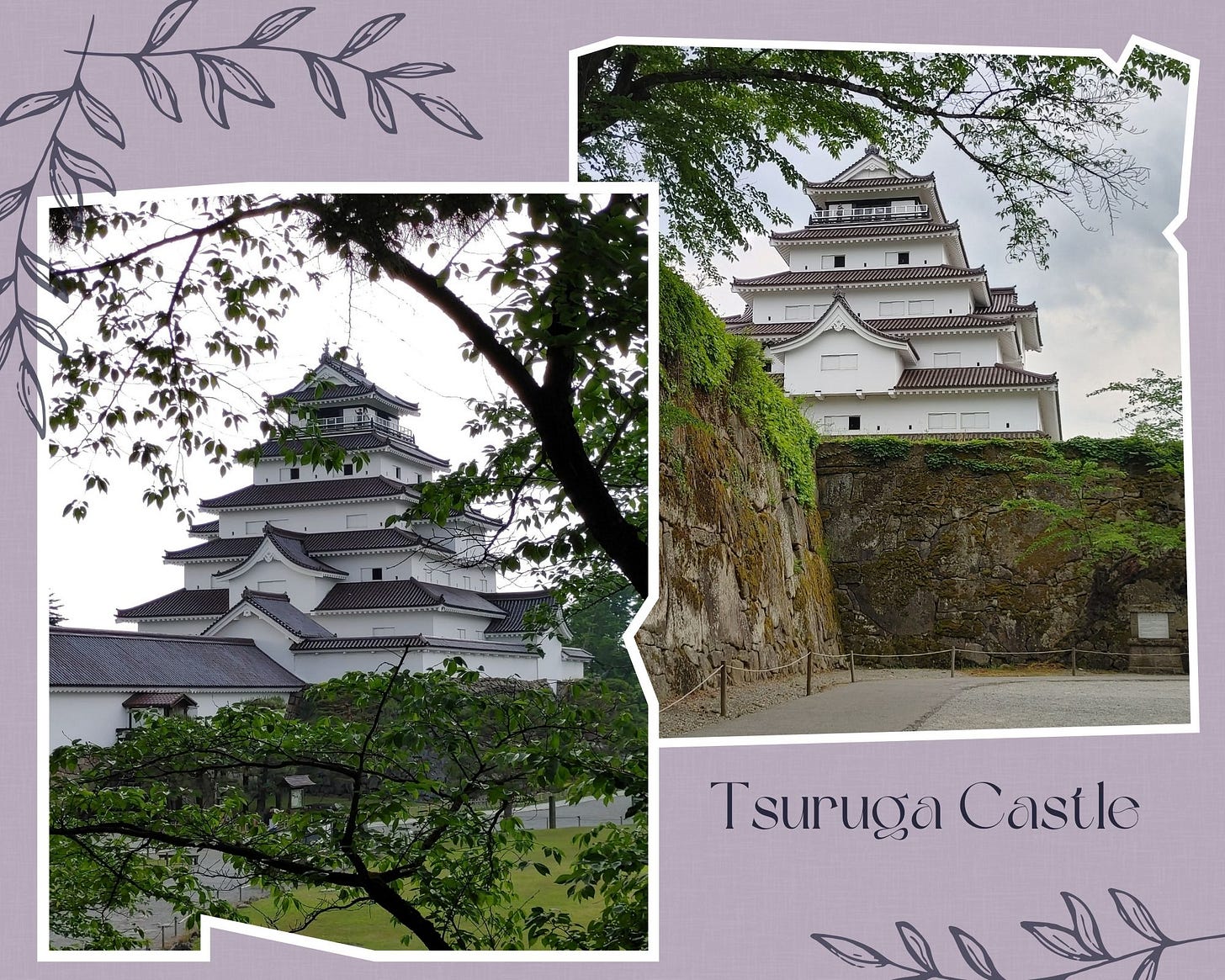
There was a lot of history surrounding this castle (isn’t there always?!) and I particularly enjoyed the museum inside the castle tower where I learnt a bit about the history of Aizu. There were portraits of figures, men and women, that played key roles in the Boshin Civil War.
A key turning point in Japanese history, the Boshin Civil War took place as Japan had recently opened up to the West (previously they were a closed nation with very little Western influence) but there was discontent among many nobles and samurai. They didn’t like the unfair trading policies or the decline of their economy that had come about due to the increasing Western influence and unfair trading laws.
What I found intriguing, was that individuals who had been fighting against the government to keep Japan closed to the West, once they lost the battle, they ended up in key roles in government, working for the “other side”.
How could the government trust them, after they had been fighting against them?!
Shujin explained that, once the battle was lost, they knew they had to accept the fate. I still found it interesting that they were given prominent positions!
After enjoying the sight seeing and historical lessons, it was time to find our accommodation for the night. Thank goodness for Google maps! That’s all I will say!!
We picked out our beds and sorted ourselves out and still had time enough to walk through town to find dinner. There was no rush. Off we set, occasionally passing a restaurant but not one we wanted to eat in.
The sky got darker and our bellies got louder. More whinging and complaining from the kids. More self-control from me, trying not to be hangry.
Where was the centre of this town? Where are all the shops? Where’s the street/s lined with restaurants?
Alas, we were in Japan, and town planning was different. Scattered like feathers in the wind, it’s as though you need to be in the know of good eateries, if you want to find something!
We had walked a considerable distance from our accommodation, and I was mindful that we would have to walk back as well! Thankfully we finally happened upon an onsen (hot spring) which also had a restaurant inside. It would be simple food, but that was totally fine by everyone at this stage!
Hungry eyes scanned the menu, the order was placed and then the torturous time came. The waiting.
Food would come out of the kitchen and be delivered to other tables. It was almost too much for Bob to bear. When would our food come?
Mum being mum thought to offer a distraction from the complaining so she turned to Okasan and said,
“So, your mum was born in this town?”
Okasan’s face was blank.
“I don’t know,” she answered with confusion.
Mum’s face turned to confusion!
“Oh, I thought your mum was born here…” it was no use explaining to Okasan that she had been telling us all afternoon about this town being the birthplace of her mother! It took all my willpower to hold in my laughter!
The next morning we went to Mt. Iimoriyama on the edge of Aizuwakumatsu city and there we stood on the very site where 19 young samurai killed themselves at the end of the Boshin War. They had retreated to the mountain, and when word came that they had lost the battle, they committed suicide by harakiri, by stabbing their own belly with their sword and slicing it open. It is the samurai way to preserve their honour, despite the battle loss. Some of these samurai were as young as 14 years old.
I looked at Bob, not long turned 13, and I couldn’t imagine him doing such a thing. I felt pain for the mother’s of these young boys.
Shujin turned to me, “What do you think Japan would be like today if they hadn’t lost that battle, and if we were still closed to the rest of the world?”
“Japan would be an advanced nation. Look at how it was before they opened the country: Incredible architecture that withstood earthquakes, trading routes, roads, delicious cuisine, exquisite fashion, exceptional craftsmanship. There is also so much order in Japan, systems that make everything run well. It would have continued to be a thriving and sophisticated culture, maybe just lagging in the technology.”
We had a whole day before us and many places to choose to visit. Shujin drove us to Ouchijuku, a traditional village complete with thatched roofs. The drive was stunning. I love this time of year in Japan. Countrysides were lush green and the rainy season hadn’t started yet so the sky was clear blue and sunny with puffy white clouds.
We crossed a tall bridge and I begged Shujin to pull over. I just had to walk back across the bridge and soak in the scenery, it was stunning!
We continued on a drive through the countryside and suddenly, in the middle of nowhere, there was a large carpark, with more parking areas further along the road, filled with cars and coaches!
We had arrived at Ouchijuku!
It was a fun village to walk through, complete with dusty dirt streets lined with deep gutters gushing with water, wooden buildings, many with their thatched roofs and lots of shops to look at. One building was getting a new thatched roof. Lots of people milled around which helped add to the fun atmosphere.
Shujin happened upon a little known “secret” so at the top of the village we walked past the shrine and continued on the path which eventually led out to the main road. And here, in broad daylight for all to see (but no one was looking!) was what my friend calls Liquid Gold: natural spring water, pouring from the earth. In Australia it’s a very rare find indeed, but in Japan it’s actually quite common! (Another thing I love about this country!)
We drank freely, filled our water bottles and with renewed strength, headed back to Uochijuku. As we walked through the village I was trying to keep track of everyone and turned to look for Okasan. She was just leaving a shop with Shujin, wearing a pretty pink sun hat.
You have got to be kidding me! Another hat??!!!
I’ve previously mentioned that Okasan has quite the collection of jackets, but she also has quite the collection of hats! She loves hats and, to her credit, she wears them. Sometimes two at once (no joke! Japanese have a fear of sun touching their skin!)
I was far from impressed about her having another hat and as soon as Shujin caught up with me I hissed at him,
“Your mum bought another hat??!!” I was not happy! I know a hat takes up very little space, but still, we were living in a house-built-for-two with six people!!!!
“Yep.”
“Why did you let her buy another one? She has sooooo many already!”
“But she doesn’t have a pink one!” smiled Shujin.
I groaned. But before the day was out, I was already feeling the benefits of her wearing a pink hat. Japanese wear precious little colour. A pink hat stood out like a sore thumb, absolutely perfect for keeping track of her in a crowd!
But the pink hat’s usefulness could only go so far…

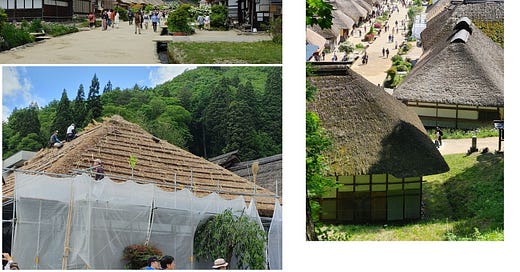


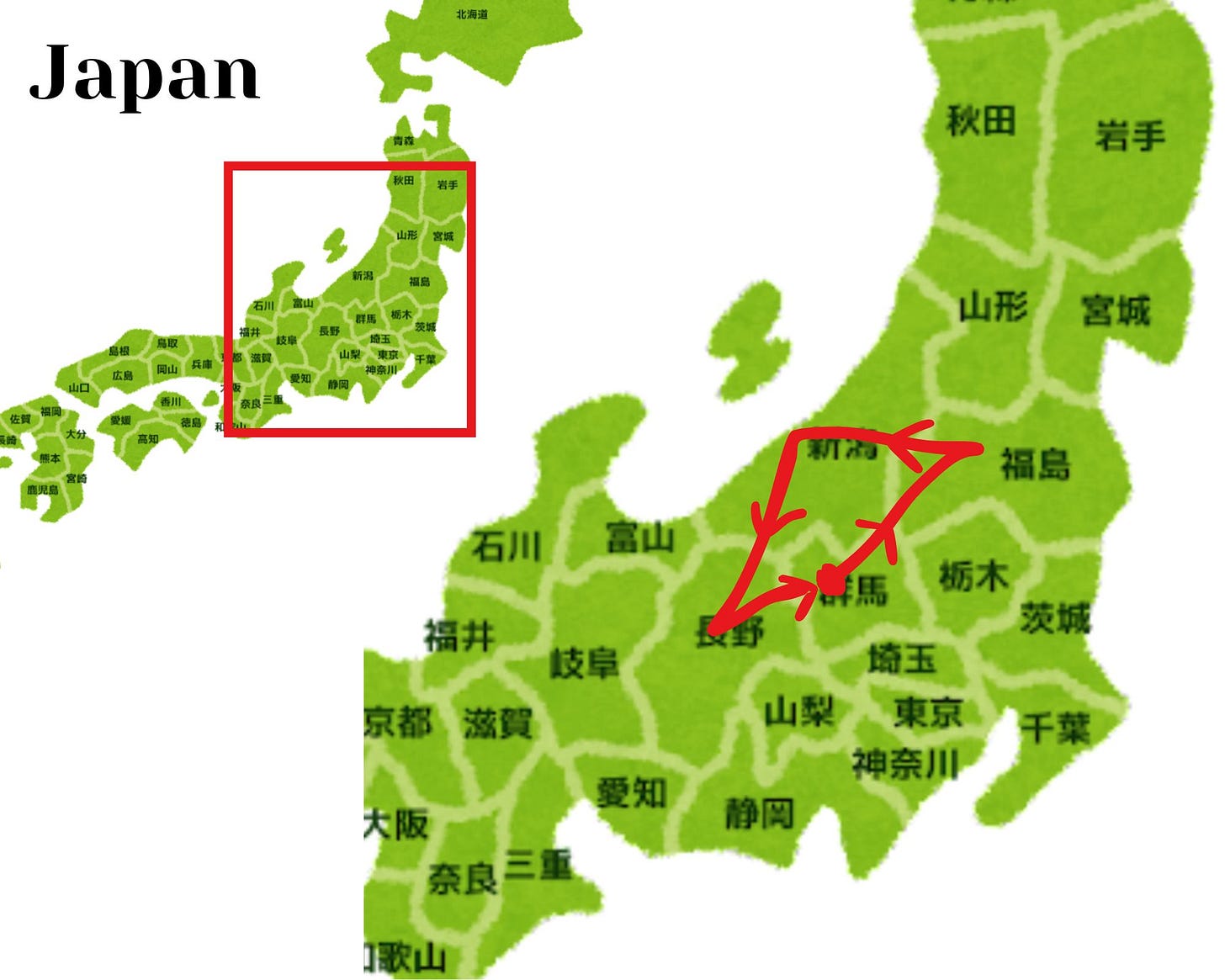
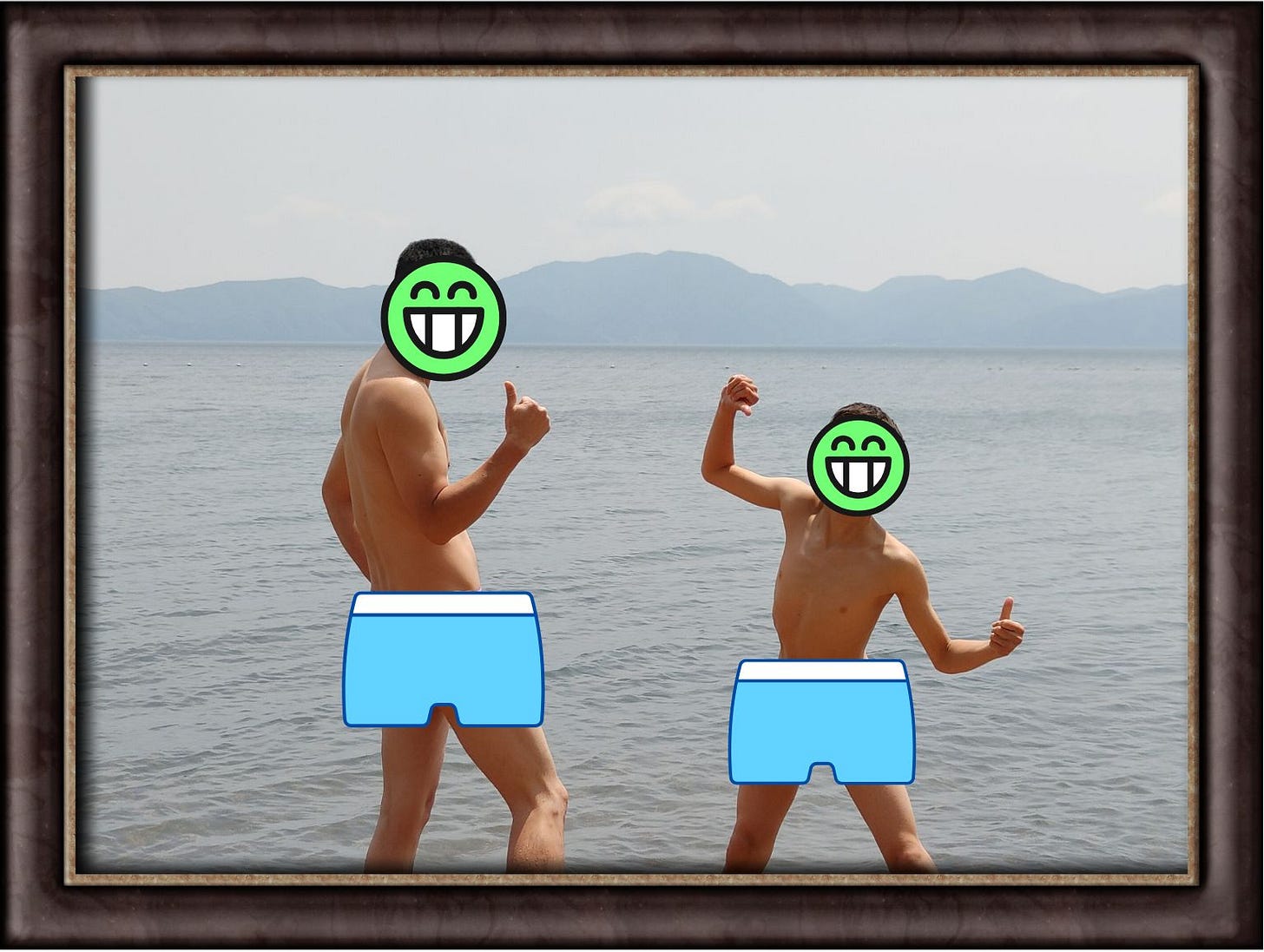
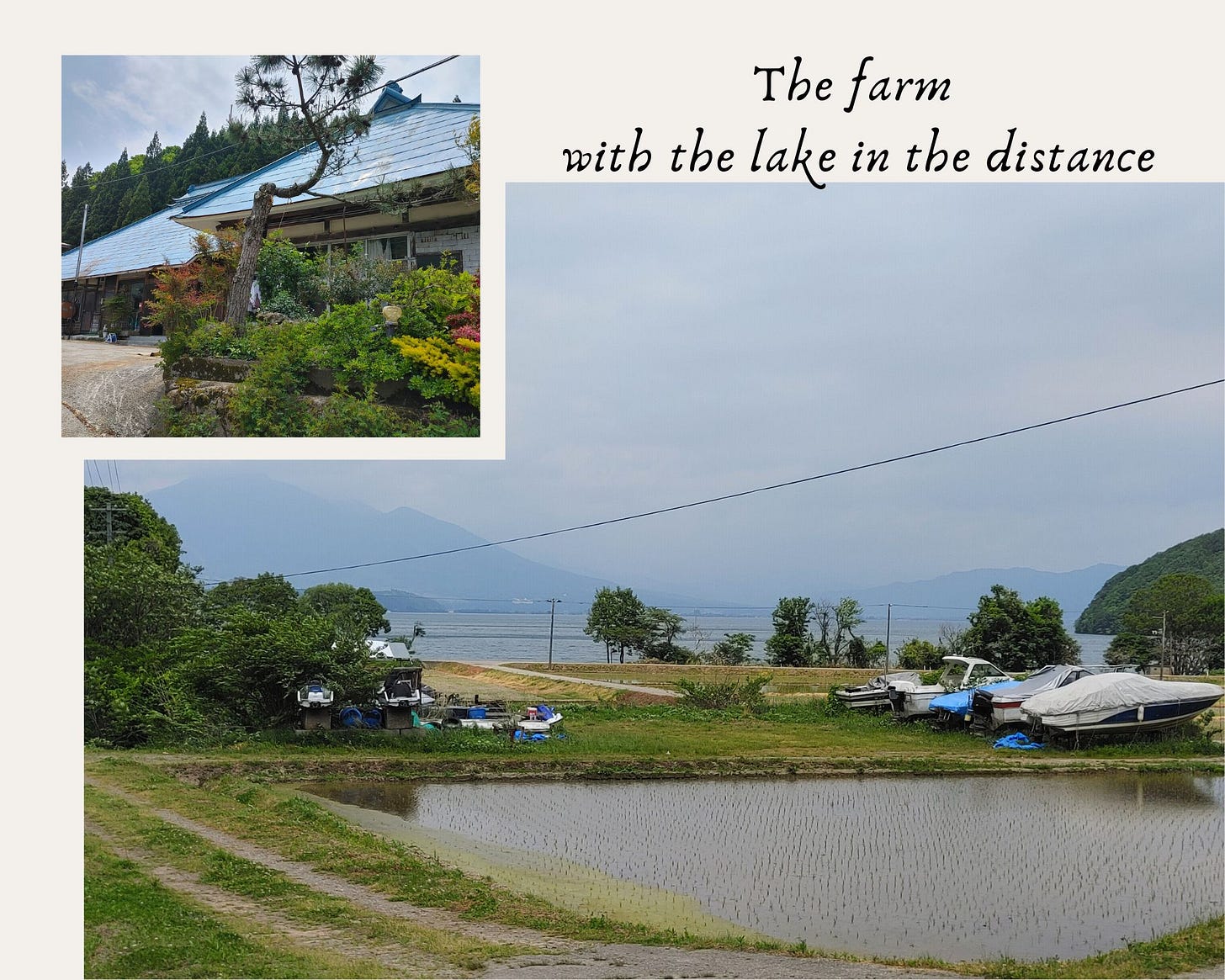
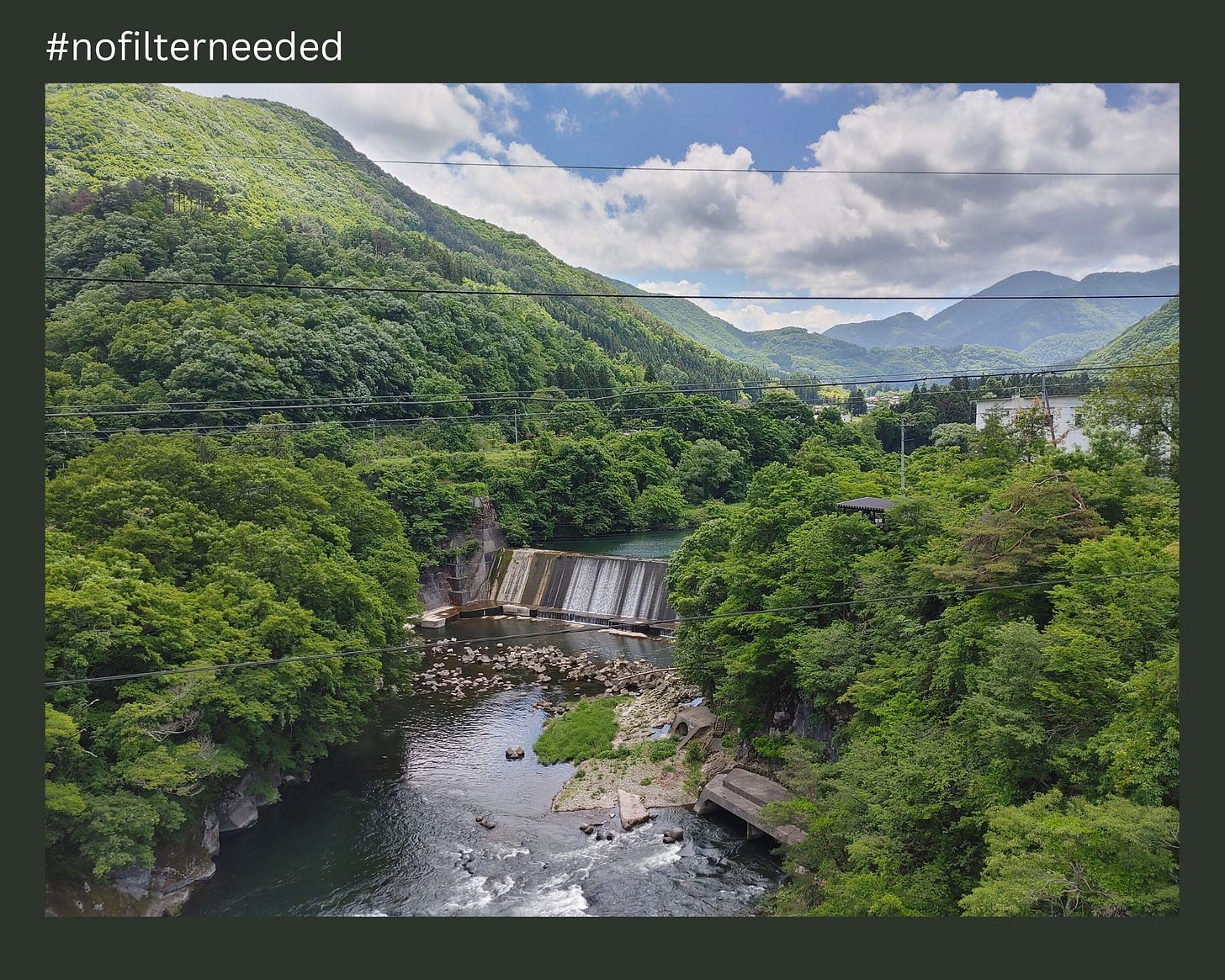

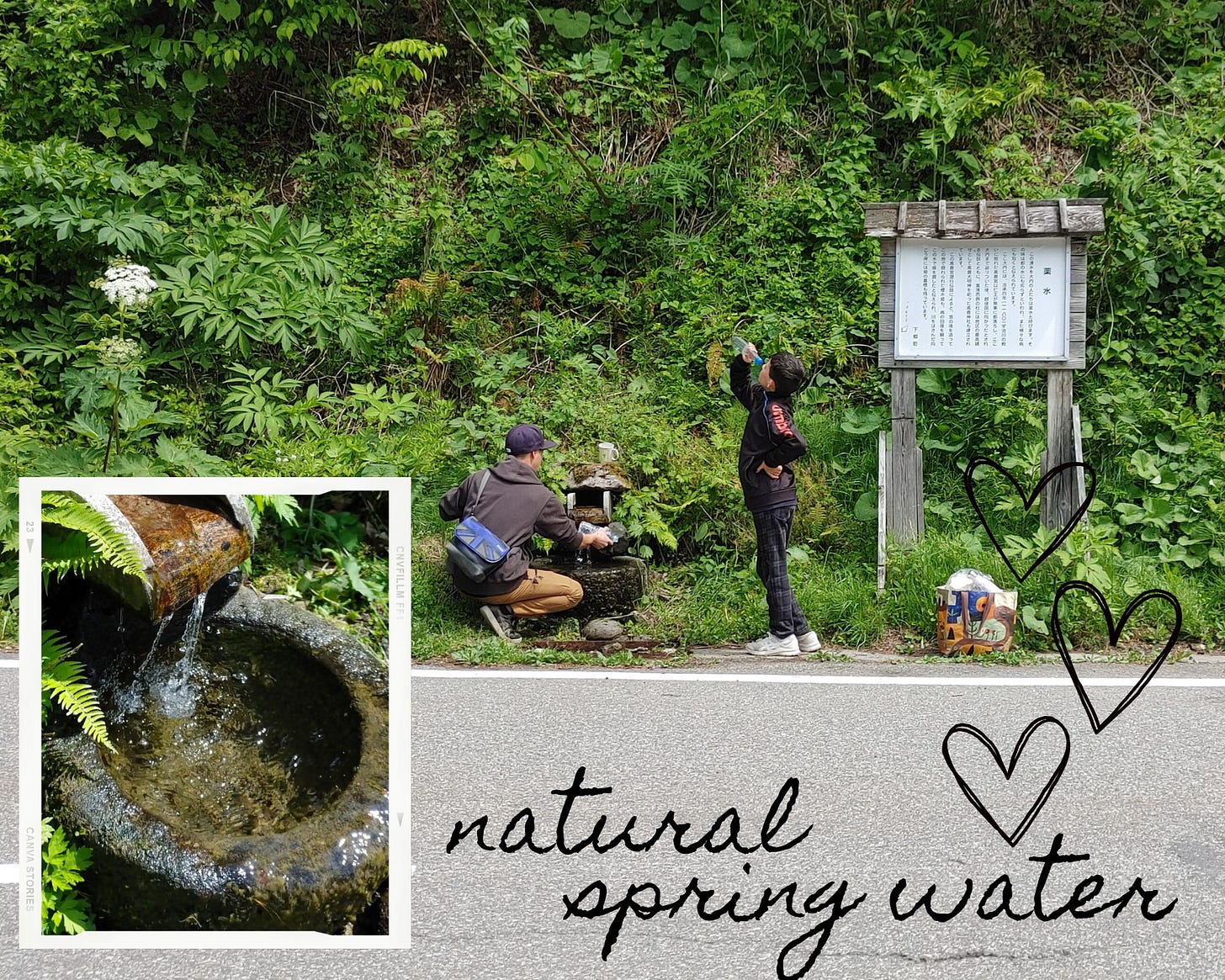
I love your stories ❤️
what an amazing trip, your parents must have loved seeing the beauty of the countryside.